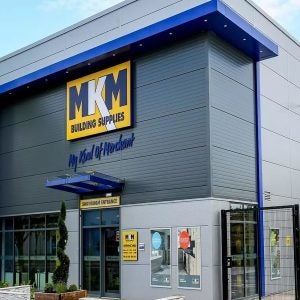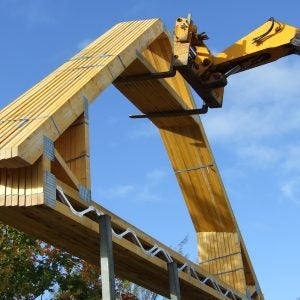Sales and profits were up across the board in the first half of 2022, with some sawmillers recording their best ever results. But a cooling of demand in some quarters, as well as issues with higher energy costs, plus other factors means there is no room for celebration.
Södra Group posted its highest ever quarterly earnings last month for Q2 – operating profit totalled SEK2.325bn (2021 Q2: SEK1.326bn), while net sales were SEK8.953bn (2021 Q2: SEK7.287bn). Its wood product business area saw operating profit for the period at SEK866m (2021 Q2: SEK827m) and reflects the sustained favourable prices for sawn timber, but at the same time demand for sawn timber decreased during the quarter.
“Market uncertainty has increased considerably due to global turmoil and negative economic growth,” said Lotta Lyra, Södra CEO.
“This could affect our core products moving forward, as slowing demand in Europe’s consumer-oriented building materials trade at the end of the quarter has already shown.”
Finland-based UPM said it delivered record Q2 results and expected to reach record annual earnings in 2022.
Q2 sales increased by 7% to €2.562bn (2021 Q2: €2.384bn), while comparable EBIT grew by 26% to €387m.
Jussi Pesonen, UPM president and CEO, said the company’s businesses reported strong earnings amidst a volatile environment of rapid inflation in input costs and challenging supply and logistics chains.
Sales prices increased in all business areas and more than offset the negative impact of higher variable costs.
UPM decided to suspend its deliveries to Russia, purchasing of wood in Russia and the UPM Chudovo plywood mill operations.
Market fundamentals for UPM Fibres were strong in Q2, for both pulp and timber.
UPM Plywood’s earnings stayed at near-record levels.
“Rarely have there been so many uncertainties in the world and in the global economy as there are today,” the company said. “We are well prepared to face this uncertainty as our businesses are competitive and performing well, and our financial position is strong.”
Stora Enso has raised its full year results guidance to be higher than its record year 2021.
As it entered the third quarter it reported seeing early indications of a normalisation of demand in traditional sawn goods, albeit from peak levels.
The company has sold two sawmills in Russia to local management and minor formalities for Russian legal entities in the wood supply operations will be completed in H2, which will mean Stora Enso will no longer have exposure to Russia.
“In wood products, we have passed the demand peak from historically high levels for traditional sawn products,” it said.
“The construction market is slowing down due to elevated inflation and availability of other building components. However, our Building Solutions segment is benefiting from long projects and governmental policies and sees sustained strong demand for both cross laminated timber and laminated veneer lumber.”
Stora Enso’s sales increased in Q2 by 18% to €3.054bn (2021 Q2: €2.592bn), while operational EBIT increased by 39% to €505m (2021 Q2: €364m). Stora Enso’s wood products division saw a 40% increase in sales in H1, 2022 to €1.204bn, with operational EBITDA growing 57% to €275m. Q2 demand was described as significantly weaker than a year ago and weaker than in Q1.
Metsä Group said Q2 was the best quarter in Metsä Group’s history, in terms of operating profit.
Its first-half results show sales of €3.41bn (2021 H1: €2.94bn) and operating profits of €589m (2021 H1: €379m).
The company said the economic impacts of the Ukraine conflict, consumers’ declining trust and the increase in market interest rates resulting from rising inflation will lead to decreasing demand for construction in Europe.
The company cited the prospective difficulties in Europe in obtaining natural gas, which has seen countries and companies looking for alternative energy suppliers.
It also mentioned challenges in replacement of Russian birch logs in plywood production, with the issue being partly solved by increasing the share of spruce plywood production.
The company has recognised a write-down of €87.5m related to the discontinuation of business operations in Russia. Its only Russian production unit – the Svir sawmill – has been discontinued, as has wood procurement from the country.
Metsä’s wood products division recorded H1 2022 EBITDA of €30.9m (2021 H1: €23.9m) and sales of €344.9m (2021 H1: €297m), with engineered wood product deliveries reaching 265,000m3 in the six month period.
The pulp and sawn timber division recorded first half sales of €1.480bn (2021 H1: €1.213bn). Sawn timber deliveries were down in H1 and Q2 compared to the previous comparable periods.
Wood products company Setra has reported that the effects of Russia sanctions on the supply of wood products are likely to be more pronounced in Q3.
“Uncertainty about the direction of the economy is creating a cautious market as we move towards the autumn,” says Katarina Levin, Setra’s CEO.
Setra reported a Q2 operating profit of SEK564m (2021 Q2: SEK442m). Net sales totalled SEK1.792bn (2021 Q2: SEK1.529bn).
The outlook for Setra’s long-term development, and the future for wood more generally, remains positive, but the company said some uncertainty remained in the short term, with the security situation in Europe, the global economy post-pandemic and Russia’s invasion of Ukraine affecting the global wood products market, driving up costs and causing turbulence in the logistics industry.
Swedish forest products giant SCA reported its highest earnings ever in the second quarter.
The company attributed the performance – which shows EBITDA of SEK5.72bn (2021 Q2: SEK3.61bn) – to strong demand for its products.
Its wood division delivered less wood than a year ago – 535,000m3 for Q2 – but net sales were up 25% to SEK2.2bn, while EBITDA grew 49% to SEK933m. The higher selling prices and positive exchange rate effects during the period boosted the performance.
The half-year performance was up 29% and 67% in terms of net sales and EBITDA respectively.
Versowood recorded sales of €650m for its fiscal year ended June 30, the company’s turnover having nearly tripled in the past 10 years.






